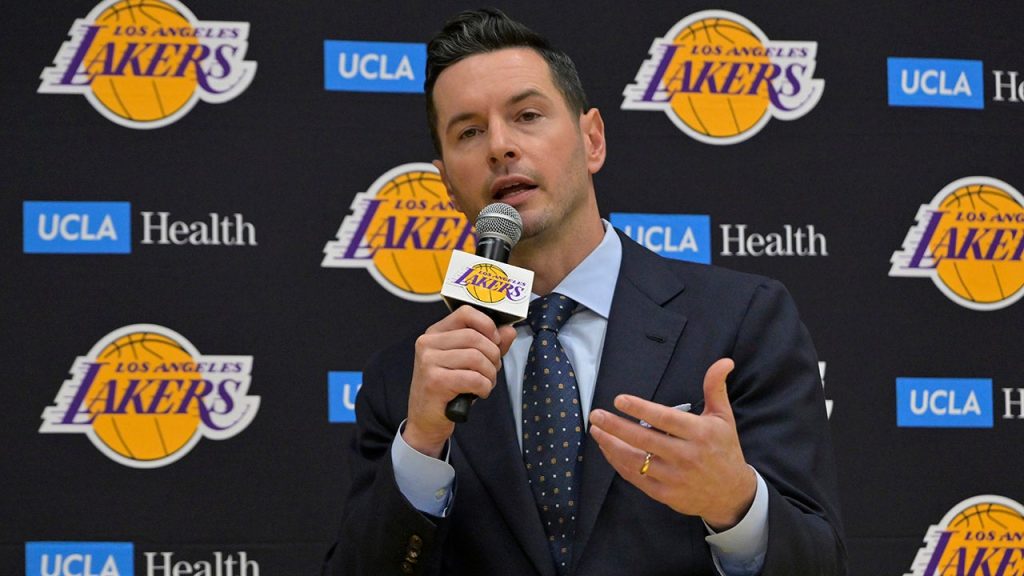The affluent Pacific Palisades neighborhood of Los Angeles found itself at the center of a rapidly unfolding crisis on Tuesday as a wildfire, fueled by dry offshore winds and exacerbated by persistent drought conditions, swept through the area, forcing thousands to flee their homes and prompting widespread concern. Among those directly affected was Los Angeles Lakers head coach JJ Redick, a resident of the community, who expressed his anxiety and offered prayers for the safety of his family, friends, and neighbors ahead of his team’s game against the Dallas Mavericks. The fire, which ignited under ominous “red flag” conditions, quickly escalated into a major emergency, prompting a massive evacuation order affecting over 26,000 residents and threatening more than 13,000 buildings.
The scale of the disaster drew immediate attention from state and local authorities, with California Governor Gavin Newsom visiting the scene to receive briefings from fire officials. The Los Angeles Fire Department (LAFD), supported by firefighters from neighboring agencies, deployed over 250 personnel to combat the blaze. Amidst the chaos and uncertainty, Los Angeles Mayor Karen Bass was notably absent, attending the presidential inauguration in Ghana, raising questions about the city’s leadership presence during the emergency. The fire’s rapid spread highlighted the vulnerability of even affluent communities to the increasing threat of wildfires in California, underscoring the urgent need for proactive fire prevention and mitigation strategies.
Redick’s personal connection to the unfolding tragedy added a human dimension to the disaster, emphasizing the widespread fear and disruption experienced by residents caught in the fire’s path. His pre-game comments reflected the shared anxiety of a community facing an immediate and unpredictable threat. The evacuation of his and his wife’s family, including his wife’s twin sister, underscored the urgency of the situation and the indiscriminate nature of the disaster, affecting even those with the resources to live in a typically well-protected area. This personal account from a prominent figure served to heighten awareness of the unfolding crisis and amplify the calls for support and prayers for those affected.
The Pacific Palisades fire provides a stark illustration of the growing challenges posed by wildfires in California, highlighting the confluence of factors that contribute to their increasing frequency and intensity. A prolonged drought has created tinderbox conditions across the state, with dry vegetation providing ample fuel for rapidly spreading fires. Strong offshore winds, known as Santa Ana winds, exacerbate the situation, fanning the flames and driving embers across wide distances, making containment efforts extremely difficult. Climate change, with its associated rising temperatures and altered weather patterns, further amplifies these risks, creating a perfect storm for devastating wildfires.
The evacuation of over 26,000 residents represents a significant logistical challenge, requiring coordinated efforts from multiple agencies to ensure the safety and well-being of those displaced. The presence of abandoned vehicles along major thoroughfares like Sunset Boulevard and Palisades Drive further complicated the situation, obstructing access for emergency responders and hindering evacuation efforts. The Los Angeles County’s decision to move these vehicles underscored the need for swift action to clear vital routes and facilitate access for firefighters and other emergency personnel. The scale of the evacuation also highlights the importance of community preparedness and the need for residents to have evacuation plans in place.
The Pacific Palisades fire serves as a stark reminder of the increasing vulnerability of communities to the devastating effects of wildfires. The incident underscores the urgent need for comprehensive fire prevention and mitigation strategies, including stricter building codes, improved land management practices, and enhanced community preparedness. The ongoing drought and the projected increase in extreme weather events necessitate a proactive and coordinated approach to address this growing threat. The experiences of residents like JJ Redick and his family, along with the widespread disruption caused by the fire, emphasize the human cost of these disasters and the importance of collective action to mitigate their impact.

